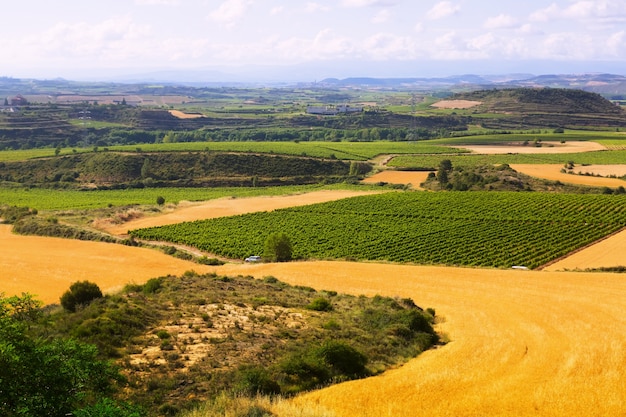AGROECOLOGY
- A WORLD WITHOUT PETROLEUM
It will be
almost 50 years since the time of the first major oil shock of 1973 that we are
told over and over again that the world's oil reserves will be exhausted in 50
years. In 1972, when this serious crisis was looming for a year, the Club of
Rome, with the help of a group of MIT researchers, had even planned a depletion
of oil reserves twenty years later, in the publication "The limits to
growth" https://www.clubofrome.org/report/the-limits-to-growth/
That will
definitely happen, that's for sure, although no one is able to predict
seriously when that happens. However, one must not be a diviner to understand
that a mining resource that is extracted and consumed at this rate, necessarily
has a short life expectancy.
That's
what will happen at the end of the oil era that interests me today.
Picture: http://aboutsuzzanneuhland.com/wp-content/uploads/2017/07/dirty-industry-stack-factory_oil.jpg
Petroleum is
the basis of an incredible and very diverse industrial and economic activity,
chemistry, pharmacy, agrochemistry, textile, plastics, glues, paints,
transports, lubricants, fuels and all their derived products such as paraffin
for example. This immense activity will then stop, at least in its present
form. Petroleum is today the flagship raw material for all human activity.
Faced
with this preponderant place, a huge research activity has been set up, for
several decades, to find alternative raw materials for all these activities and
productions.
Moreover,
the very fertile human genius has already found alternatives for many things.
It is often the price, the resistance or the difficulty of supply which makes
complex their generalization, as one sees for example for agricultural plastics
of vegetable origin. To these technical or economic difficulties, is added the
resistance of the current industries which, sometimes, slow as much as they can
certain solutions likely to make them competition.
Replacing
such a versatile and economical raw material is not easy, especially since oil
has shaped, in 150 years, an economic and industrial model whose adaptation is
complex.
To
put it simply, we can say that petroleum substitutes are oil, cellulose and
fibers. These three essential elements to replace petroleum come all from plant
and animal production.
The future
of humanity therefore passes through agriculture. It's no secret to anyone when
it comes to food. But it is likely that few people are aware of it with regard
to the chemical industry, textiles, plastics, many modern materials or fuels.
In short, the future of human
activities depends on agriculture.
The
end of petroleum will profoundly upset the geopolitical balance of the planet,
and powerful countries will be those who have been able to preserve their
productive capacity in agriculture, whether by preserving agricultural land, by
maintaining soil fertility, or the quantity and quality of freshwater resources
available for agriculture.
This is
where agroecology comes into play, not through the ideologies that are linked
to it, but through its development by political choice, and especially by its
daily practice by farmers, and in the diversity of its many facets. .
Will major
grain countries such as Ukraine still be able to produce as much without a
shift to better conservation practices?
Will
the frequent refusal to create water reservoirs for ecological or political
reasons turn into a serious agroecological problem?
Picture: https://www.entrepriseetdecouverte.fr/wp-content/uploads/2016/03/5817_EDF_BARRAGE_VASSIVIERE.jpg
Countries
must develop their agricultural potential with a long-term vision, based on
conservation agriculture, which can produce a lot while preserving the
fundamental resources of biodiversity, soil and water.
Industrial
agriculture is not bad in itself. Producing on a large scale has its advantages
in terms of quality of structures, compliance with protocols and standards, and
investment power, as well as the provision of products. But it must be clearly
framed and controlled to avoid the risk of social and environmental drift.
In my
opinion, organic farming, in its current forms, will not be able to meet all
the needs of humanity in view of the disappearance of the current main raw
material.
The current
promotion of permaculture as a model to follow and as the future of the world,
is more a need to reassure oneself of an intellectual class, mostly favored and
urban, largely disconnected from reality, than a farsighted vision of the real
needs of humanity and of the planet.
Feeding the world is one thing, but
providing it with food, energy and raw materials is another.
The
reasonable path to the future is in the middle ground, as is very often the
case. And in the case of agriculture, the middle ground lies in an intensive
production, but respectful of the environment and the consumer, which does not
refuse the chemistry of synthesis by pure dogmatism, but chooses all its
production practices for their combination of technical and agronomic
advantages on the first hand, and their minimal effects on the environment and
health, as well as the saving of resources on the other.
Picture
of my own
This
agriculture already exists. It is constantly changing, improving day by day,
but does not have a real political and social recognition because it does not
refuse synthetic chemistry. It is called
conservation agriculture for annual cereal and industrial crops, and integrated
agriculture for perennial crops and market gardening. But it is not
considered politically correct, and finds itself placed by civil society at the
same level as industrial agriculture or even the agricultural productivism
resulting from the Green Revolution, as it was practiced in the 1960s.
It is
totally different, however, and is much closer to organic agriculture than
industrial agriculture.
But she has
the disadvantage of not to submit to dogma and must be kept quiet.
Guardians of
this dogma are in particular the big environmental NGOs, with the support,
declared or not, of many personalities of the politics, the spectacle, the
cooking and the journalism, and don't accept what they consider as a deviance.
"It's hard to accept the truth
when the lies were exactly what you wanted to hear." (Quotation of unknown
origin found on Web).
Organic
farming retains its place in this agricultural panorama of the post-oil era, to
serve a demanding public, rather wealthy, and rather urban. It also remains an
important source of evolution and search for new solutions. The fact of never
being able to resort to certain solutions obliges to invent, to imagine.
Organic farming, in all its forms, is an excellent laboratory of progress.
But
agroecology is both a farmer's decision and a political orientation.
Countries
that are interested in it, or have already chosen to make it a socio-economic
goal, need to make progressive decisions.
Nobody must
ever forget that agriculture is not a
person.
Agriculture is a whole, a set of
people, businesses and interdependent activities, often fragile, that should be
changed gradually and with the necessary support so as not to weaken them
further.
Countries that will be able to
properly prepare for this post-oil era have a bright future ahead of them.
Still, it will be necessary to
arrive at this crucial moment with an agriculture in good condition, capable of
responding to these new challenges.





This is very educational content and written well for a change. It's nice to see that some people still understand how to write a quality post.! Oil & Gas Calgary
RépondreSupprimer